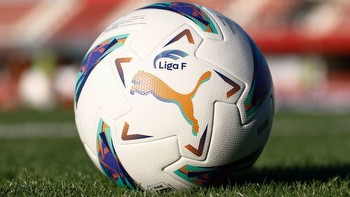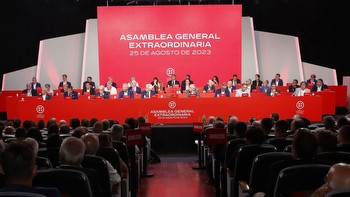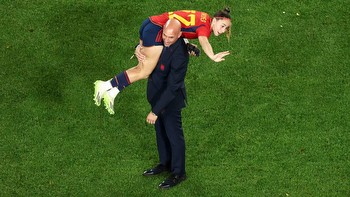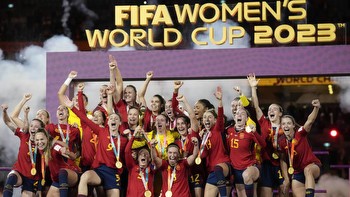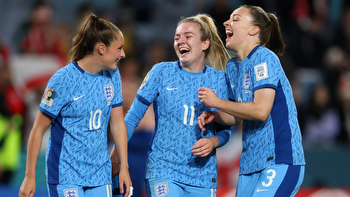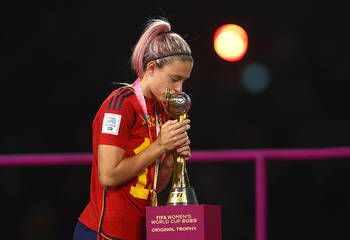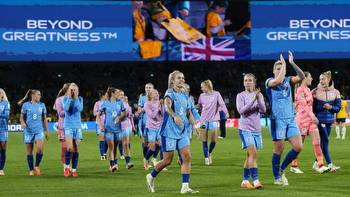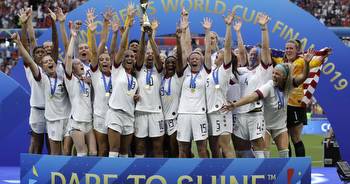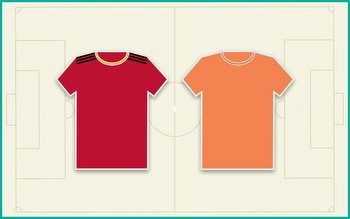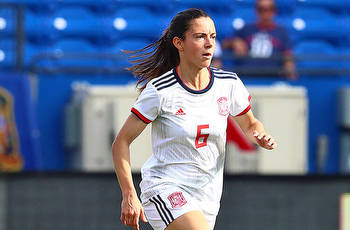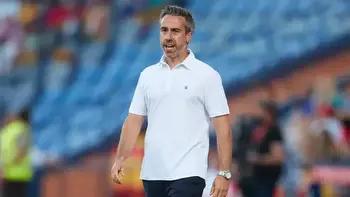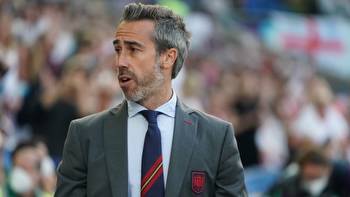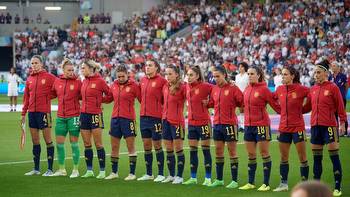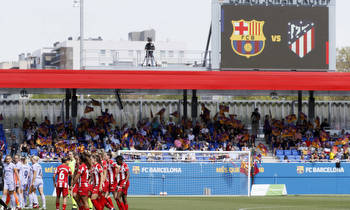Spain’s World Cup win cements Vilda’s position but players are stronger, too
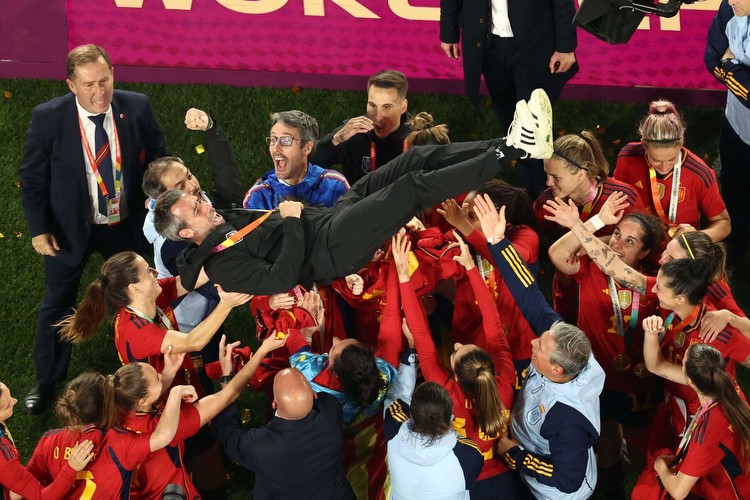
Amid the euphoria of winning a first Women’s World Cup, there was an unavoidable sub-plot for Spain.
As players embraced each other and then stepped forward to collect their winners’ medals, Jorge Vilda was booed by the crowd. Booed before kick-off and booed as he stepped onto the podium to be crowned a world champion.
The concern for some connected to Spanish football will be that the team’s remarkable success has, in fact, strengthened the position of a manager that so many of them do not respect. Some of Spain’s players, after all, even asked for Vilda to resign during the Euros last year.
In the aftermath of the victory over England, the ill feeling that lingers between some members of this Spain squad and their manager was not evident. Vilda was embraced by the players and hurled into the air.
But it is only a matter of months since unhappiness at the environment surrounding the national team meant a group of 15 players signed a letter demanding improvements from the country’s federation (RFEF). They were unhappy with Vilda, but the federation backed its man and he remained. Only three of those 15 players made it to this World Cup.
The truth is the team’s success probably has strengthened Vilda’s position and can be seen as a vindication of his employer’s decision to stick with him. That the team’s official social media account posted ‘Vilda IN’ at full-time suggested that is the case.
— Selección Española Femenina de Fútbol (@SEFutbolFem) August 20, 2023
But it also strengthens Spanish women’s football.
It reinforces that betting on it pays off. It has done so for Barcelona, a club now at the pinnacle of European football but who not so long ago did not provide the conditions for players to reach those heights. And it is paying off for a Spanish national team that has had to suffer a rebellion to change the minimum requirements to win a title.
“I hope this helps us all to row in the same direction so that future generations have the best conditions in the Spanish league,” said Aitana Bonmati, shortly after being named the tournament’s best player. “Today we played against England. I hope we can learn from the English league, it is an example. How they treat their players, the pitches, the conditions, everything. We will have to learn from them. I hope it helps.”
GO DEEPER
Aitana Bonmati exclusive interview: 'There's no hiding. It's what comes naturally to me'
When Spain’s players return from Australia, they can expect to be greeted as heroes. It will be a sign of how the game has grown in the country over the past 26 years.
In 1997, Spain qualified for an official competition for the first time. They did so with a team that did not expect to qualify. Their goalkeeper, Roser Serra, counted so little on being in the European Championship in Norway and Sweden that she bought tickets to attend an Oasis concert that was being played during the tournament and, due to her participation, had to sell them.
In their first participation in an official championship, Spain came third. It was historic and they imagined huge crowds awaiting their return in Madrid. But none of that happened.
“Some articles did appear, but the media spotlight was not on us. We didn’t appear on any front page,” recalls Alicia Fuentes, one of the top scorers in that team.
“We didn’t see any fans or press when we arrived, and it was a historic event. For us, it was something we never imagined we would achieve. It was nice to remember it but in terms of effects, it was invisible. We were so excited to get there and when we arrived… I don’t even remember it.”
Fuentes has seen the evolution of Spanish women’s football pass before her eyes. She played for Levante, who became the first Spanish team to play in the UEFA Women’s Cup (the Champions League equivalent of the early 2000s) and to achieve a perfect domestic season.
She retired three years ago at the age of 42, being the only player in her forties to play in the Primera Division. Between 2008 and 2010, she played for Barcelona, a club that stood out in Spain in terms of infrastructure, but was far from being the team it is now.
“In almost all the teams I played for, I had to combine work with football,” she said. “I have had to combine coaching teams with playing football. The conditions in terms of timetables and pitches were always the most unfavourable. Until the end of my career as a footballer, I couldn’t train in the morning or have a whole pitch to train on.
“I trained on a quarter of a pitch shared with other men’s youth teams. At Barca, we had a prefabricated module as a changing room. We only had 10 minutes of hot water. We all raced to be the first to take a shower, because the last ones had to take a shower with cold water. In summer it was still cold, but in winter it was unbearable.
“We were the team that always had to adapt. We had no preference whatsoever.”
Bonmati, a midfielder for the modern Barcelona, referenced her predecessors after the match. “I dedicate it to all those women who fought in the worst moments of women’s football,” she said. “Years when they had no conditions. They tried to fight for their dream when there was no support for women’s football. We are all part of this.”
The best club in the Spanish league is now at the top of the European elite but it was not so many years ago when the closest thing to playing at Camp Nou was playing on ‘pitch 9’ (‘camp nou’ in Catalan) of their training ground at 3pm.
Spain has had a fully professional league since 2021. The players had to strike once — and threatened to do so again on another occasion — in 2019 to fight for a collective bargaining agreement that was achieved with much delay and offered far too little in the way of conditions.
They wanted a minimum wage that would prevent some players from working jobs alongside football to afford housing. They wanted rights to become mothers without giving up their profession.
The text took 18 months to draft. It was agreed there would be a minimum salary of €16,000 (£13,700, $17,400) gross per year. In addition, they were to be considered footballers who devoted 100 per cent of their time to football, not just 75 per cent as had been the case until then. This led to some clubs giving them part-time contracts, even though the truth was they had to look after themselves every day at all hours to be able to play football.
In theory, the agreement should feature a maternity clause. But the Spanish footballers’ union (FUTPRO) subsequently said that it was not included.
When the final whistle blew at Stadium Australia on Sunday, three veterans of the team — Jennifer Hermoso, Alexia Putellas and Irene Paredes — embraced, finally succeeding at a major tournament. “This is something we have been chasing for so long,” said Paredes.
They will not get many more chances on this stage and had become used to failure with the national team.
The final was a culmination of everything Spain’s players have learned this World Cup. They have come to be resilient when things don’t go well, be effective in front of goal, be more direct when they choke in possession and sacrifice themselves in defence.
Their success has had an unprecedented impact back home. Fans watched from afar as a team that seemed to be broken went to New Zealand and Australia and returned as history-makers.
Twenty-five giant screens were distributed among the main cities of the country to watch the event. The RFEF sent its president, Luis Rubiales, to be present throughout the tournament. Queen Letizia and Princess Sofia were also at the final in Sydney.
The RFEF invested money so the players’ families could travel to be with their daughters, sisters or, in the case of Paredes and Ivana Andres, mothers. At last summer’s Euros, some families complained because they were only allowed to see the players for two hours. This was one of the things the group of players who complained to the RFEF wanted to be addressed. Paredes is the mother of a two-year-old boy, Mateo. Andres’ partner gave birth to their daughter, Jara, a month before the World Cup. And they wanted to be with them during this event.
The RFEF earmarked a maximum budget of €15,000 per player to make it easier for their families to be at the event.
As well as financial support, there has been widespread backing back home too. The players and coaching staff have been receiving messages from Spain from the great names of Spanish sport, such as Andres Iniesta — Spain’s 2010 men’s World Cup hero — Rafael Nadal, Pau Gasol, Carolina Marin and many more.
But has Spain always been by their side? Is it really during the regular season?
That phrase strikes deep in the hearts of the pioneering players of the Spanish national team, who watch from a distance with pride, nostalgia and the thought that it could have been them.
There will be some of the current generation sitting at home thinking likewise — stars such as Patri Guijarro, Mapi Leon and Sandra Panos — who might have been here but whose fight against the federation meant they felt compelled to stay away.
That Spain won this tournament without them is remarkable and shows their strength in depth. Spain has the best generation of footballers it has ever had. They have been rewarded with the trophy their talents deserve.

